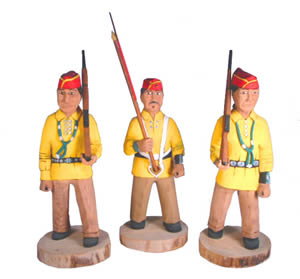The 11th hour of the 11th day of the 11th month was designated by President Woodrow Wilson as a time of commemoration of those who fell in the battlefields of World War I. Subsequently, President Dwight D. Eisenhower designated the entire day, November 11th, as the day each year to remember the fallen and others who have risked their lives in defense of the nation’s freedom and lived to talk about it. Veteran’s Day, as we know it in 2006, should be one of our most somber days of thoughtful remembrance.
We owe these heroes greatly. Among them are the Native American code talkers who were instrumental in helping the Allies defeat Japan and Germany by using their native dialects to to communicate about military movements and coordinate plans. The enemy forces, which were prepared to decode systems using English language, were befuddled by the use of Native American languages. Most well-known of the groups was the Navajo Code Talkers. Others, such as the Choctaw, Chippewa/Oneida, Menominee, Sac and Fox, Sioux, Crow, Missisauga, Cree, Comanche and Hopi, also participated and contributed their patriotic part in the victory over Nazi fascism and Japanese imperialism.
Code Talker Reference Links:
http://www.sites.si.edu/exhibitions/exhibits/codetalkers/main.htm
http://www.history.navy.mil/faqs/faq61-2.htm
http://en.wikipedia.org/wiki/Code_talker
Tribal Artery is a periodic blog about the world of tribal art from Aboriginals: Art of the First Person and its allied web sites at ZuniLink.com for authentic Zuni, Cochiti and San Felipe carvings; Native-JewelryLink.com for authentic and beautiful Native American jewelry; Native-PotteryLink.com, for outstanding examples of Native American Pueblo pottery and TribalWorks.com, for a potpourri of Native American folk, Australian Aboriginal art and African tribal art. You are invited to visit.


